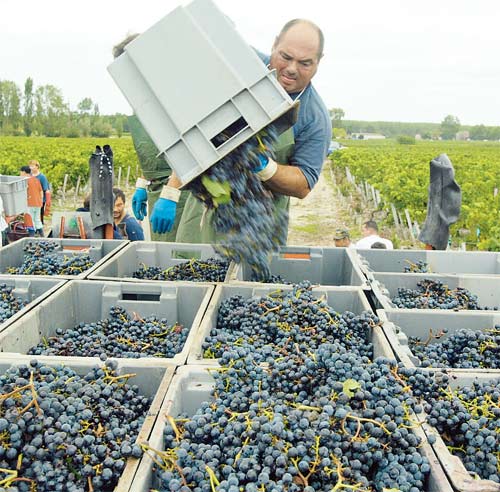Thirsty for high returns? Get into the market for red wine
The best vintages are proving to be top performers. And in this market, it pays to order the Bordeaux. Kate Hughes and Julian Knight report

Your support helps us to tell the story
From reproductive rights to climate change to Big Tech, The Independent is on the ground when the story is developing. Whether it's investigating the financials of Elon Musk's pro-Trump PAC or producing our latest documentary, 'The A Word', which shines a light on the American women fighting for reproductive rights, we know how important it is to parse out the facts from the messaging.
At such a critical moment in US history, we need reporters on the ground. Your donation allows us to keep sending journalists to speak to both sides of the story.
The Independent is trusted by Americans across the entire political spectrum. And unlike many other quality news outlets, we choose not to lock Americans out of our reporting and analysis with paywalls. We believe quality journalism should be available to everyone, paid for by those who can afford it.
Your support makes all the difference.The fine wine business is going global, which should be good news for people who invest in a little liquid luxury. And, like everything else in the world economy, or so it seems, prices are being driven ever higher by demand from the Far East, particularly Hong Kong, which earlier this year scrapped wine import duty.
"The demand for fine wine in the Far East is huge," says Joss Fowler of Berry Bros & Rudd, a wine merchant that has been dealing in fine wine for 300 years. "And I personally see no reason for this to slow. In fact, global scarcity and finding the fine wine to sell is our biggest problem now."
Since 2001, the fine wine index, Liv-ex 100, which keeps track of the price of the most traded wines, has convincingly outperformed stock markets across the Western world. But remember, the value of wine investment, like company shares, can go down as well as up.
As far as wine investment goes, shares in red Bordeaux are king, as they have the longest track record of investment performance and consistently come out top at tasting events. Wines from vineyards such as châteaux Haut-Brion, Lafite-Rothschild, Margaux, Petrus and Mouton Rothschild make up a large proportion of the red Bordeaux traded. Of course, not every year produces a great vintage, and often wine funds will try to buy across many different years, spreading risk.
Investors also have the option of purchasing En Primeur, which means the wine is bought on a "futures" basis while in the cask. Buying this way can be risky, as it may turn out not to be a good vintage. Yet the amount paid, called the "opening price" is generally lower than is fetched after the wine is bottled.
The price of top-end investment wines is eye-watering. "A case of the best wine will set you back around £12,000," Mr Fowler says. "But compared to the best items in other markets, like a Picasso or a penthouse in Hyde Park, that is incredibly cheap."
For a private investor, there are three main avenues into the wine world. A specialist fund pools investors' money to buy wine to trade, but that doesn't mean you will get to drink your returns, just as investing a stake in a racehorse won't get you into the saddle. Wine Asset Managers (wamllp.com), for example, offers the Fine Wine Fund, requiring a minimum investment of £50,000. The annual management fee is 2 per cent, plus a further 15 per cent of the fund's annual performance growth.
It is possible to pick up cases of good-quality investment wine at far lower prices. Companies such as Vinum Investments (vinuminvestments.com) will buy and sell cases on your behalf for a single investment of a minimum £1,500, or £100 monthly. The wine is yours, and can be either stored or removed for a special occasion. Investors are charged for storage and services at the time of disposal or delivery, so expect to pay between £7 and £10 a year for each case of wine set aside. Storing this way is a good idea as it provides proof that the wine has been held in the right conditions, which can aid resale.
Buying direct and storing your wine yourself is far more challenging than paying someone to do it for you. No fine wine house sells direct to the public; you will have to buy your vino in 12-bottle "units" through a merchant. Then you'll have to store the wine well. Humidity, light, temperature and movement all determine how successfully your bottles are laid down, and could easily affect the price.
But don't think wine investment is completely immune to the credit crunch. "If you do wish to invest in wine, it will need to be high end or nothing to escape the effects of the economic downturn," says Matthew Woodbridge of the independent financial adviser Chelsea Financial Services.
Join our commenting forum
Join thought-provoking conversations, follow other Independent readers and see their replies
Comments